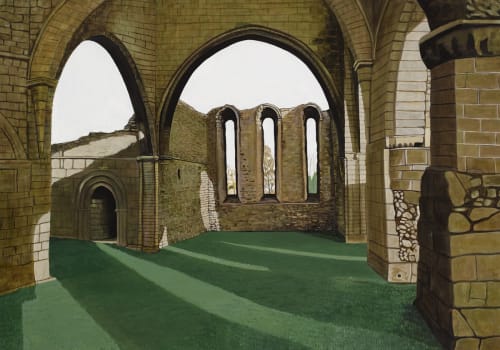Kevin Kavanagh presents WI, an exhibition of new paintings by Stephen Loughman
And did those feet in ancient time
Walk upon England’s mountain green?
And was the holy Lamb of God
On England’s pleasant pastures seen?
And did the countenance divine
Shine forth upon our clouded hills?
And was Jerusalem builded here
Among those dark satanic mills?
– from Jerusalem by William Blake
WI comprises a suite of recent paintings by Stephen Loughman that take vintage postcards issued by the Women’s institute as their source material and subject matter. The use of such postcards, which were bought in bulk at online auctions, represent a departure from Loughman’s previous method of painting from film stills and yet the work retains a filmic quality. Images of the English countryside appear lushly detailed though curiously deadpan and while the source material documents picturesque landscapes, their corresponding paintings appear densely ominous, as plotted points within a broader narrative.
A history of the Women’s Institute spanning over one hundred years includes the suffragette movement which began in 1913 as well as their contribution to the war effort during both World War I and World War II. At the beginning of the 1920s the institution adopted Jerusalem as their anthem. Originally written by William Blake in 1804, the poem celebrates ‘England’s green and pleasant land’ and centers on rural countryside as the utopian ideal.
Within WI visual motifs become apparent; tunnels, bridges and arches reference architectural intervention in the landscape as churches and thatched cottages are depicted amidst verdant forests and gardens. In an art historical context the depiction of the English countryside has long been bound up with national identity, and has continually acted as a cypher for collective consciousness. In her book Wanderlust, Rebecca Solnit wrote, ‘At the beginning of the eighteenth century, English aristocrats had linked nature with reason and the current social order, suggesting that things were as they should be. But nature was a dangerous goddess to enthrone. At the latter end of the century, Rousseau and romanticism equated nature, feeling, and democracy, portraying the social order as highly artificial and making revolt against class privilege “only natural” (Solnit, R, 2014, p109).
Loughman’s decision to work with postcards made by members of the Women’s Institute alludes to the social history of an organisation in which the word ‘domestic’ has been applied not only to the home but to the home country and the idea of nationhood. By referring to such source material, Loughman connects aspirations towards patriotism and religion with the English landscape and in this way the use of such imagery alludes to class structuring and social order.v
Through time spent with Loughman’s paintings, it begins to emerge that a history has been obfuscated or perhaps veneered. These seemingly idyllic images appear constricted – imbued with a sense of unease or discomfort. The implication of such a device within WI attests to Loughman’s ability to connect the depiction of rural England with its simultaneous social history and, as in the artist’s previous work, to modify or drastically alter the mood or tone of an image through the medium of paint.


